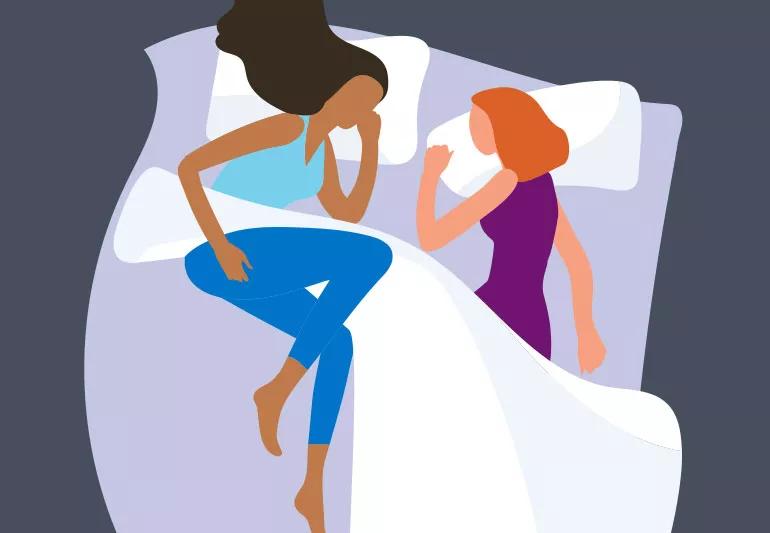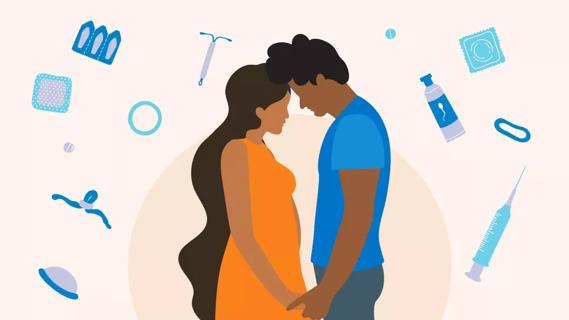Medications and therapy can help get your groove back

We all have different ideas of what an active and fulfilling sex life looks like.
Advertisement
Cleveland Clinic is a non-profit academic medical center. Advertising on our site helps support our mission. We do not endorse non-Cleveland Clinic products or services. Policy
Think of your sex life like driving to your favorite tunes: Some people drive around with their music full blast, singing along at any hour of day or night to whatever comes on. Other people keep the volume a little lower. Some people really only enjoy a few select songs or artists. Or maybe they need some time to try out a few playlists until they find just the right one to get them in the dancing mood.
Different people have different preferences — whether we’re talking music or life between the sheets. And whether your sex life is thumping party jams or tasteful light jazz, there’s nothing wrong with it … if that’s what you choose.
But what if it’s not working for you anymore? What if what you’re looking for is a sex life that’s a little bit rock-and-roll, but you can’t seem to dial up the volume these days?
A low libido can leave you feeling lonely, frustrated and unfulfilled in your relationships. Fortunately, there are ways to get your music bumping again.
“It’s not at all uncommon for your sexual interest to change and get in the way of enjoying a healthy and fulfilling sex life,” says Ob/Gyn Salena Zanotti, MD. “But you don’t have to live with low libido. There are options to increase sex drive that can be very effective.”
Advertisement
Low libido can happen to anyone. But it can be particularly common in women, in part because of hormonal makeup, as well as societal expectations regarding sex and sex drive.
Dr. Zanotti explains why females commonly experience low sex drive, and what options are available to increase your libido.
There are a number of reasons your sex drive may shift into neutral.
Physical changes can do a number on your sexual interest. New medications and other changes to your health can impact your interest in getting frisky. Your age may be a consideration, too, as low sex drive is commonly associated with changes that happen in perimenopause and postmenopause. And for some people, issues in how your body responds to sex and sexual arousal can keep you from getting in the mood — like muscle tension, blood flow and lubrication.
Additionally, emotional struggles can relegate sex to the back burner, especially if you’re living with concerns like:
And in other cases, you can experience reduced sexual desire for no obvious reason — a condition sometimes called hypoactive sexual desire disorder.
“Low libido can stem from any number of concerns, and there may be more than one issue at play,” Dr. Zanotti explains. “The important thing to remember is that you’re not alone and that low sex drive isn’t a reflection on you or your relationship.”
Depending on the reasons for your decreased sexual interest, there are medications and other options available that may help you get your groove back.
“Low sexual desire is often multifactorial, and medications may not fix it all,” Dr. Zanotti acknowledges. “It’s important to investigate the causes. Medication, along with seeing a sexual therapist, can be very helpful for various sexual dysfunction issues.”
Dr. Zanotti explains some options to increase female libido.
This prescription pill has been available since 2015. Flibanserin (brand name Addyi®) is taken nightly and can ramp up sex drive, Dr. Zanotti explains. It may cause drowsiness and shouldn’t be taken within two hours of drinking alcohol.
Don’t expect fireworks to happen immediately, though. The medication takes about two months to start working. But you may find it’s worth the wait.
Vyleesi® is an on-demand prescription medication — as in, take it when the mood is right. (Or at least 45 minutes before you anticipate the mood being right.) Vyleesi is an injectable medication you use in your thigh or abdomen.
Advertisement
Vaginal dryness can sometimes cause pain during intercourse, which can affect your sexual desire. If vaginal dryness is contributing to your low interest, you may find relief with vaginal estrogen or a vaginal DHEA suppository. That is, an insert that you place in your vagina daily. It’s a hormone treatment that’s been shown to be effective in managing vaginal dryness. That may help increase genital sensitivity in postmenopausal females especially.
Wellbutrin® is an antidepressant. But some people find that it can increase libido as a happy side effect. It may be prescribed off-label for low sex drive, regardless of whether you’re living with depression.
While medications may address some of the physical aspects of getting you “in the mood,” emotional support can help, too. Especially if your low libido is connected to any social, emotional, interpersonal or mental health concerns.
“For most people, sex and sexual arousal is two-pronged — you need your body to respond in certain ways and you also need to be mentally interested,” Dr. Zanotti explains. “If your mind is focused on other concerns, it’s easy for sexual desire to wane.”
Talking with a mental health professional can help you better address any psychological barriers that are holding your libido down.
Advertisement
If you notice a dip in your interest in sex, it can feel isolating. But Dr. Zanotti emphasizes that you don’t have to suffer in silence.
“Primary care physicians and women’s health specialists talk with people all the time about issues of sexual dysfunction and sexual interest,” Dr. Zanotti reassures. “Don’t be shy about sharing changes in your libido, especially if they’re causing you distress. Sex is a natural part of life. And your sexual health matters as much as the rest of it.”
Advertisement
Learn more about our editorial process.
Advertisement

Arousal without orgasm can be uncomfortable, but it’s no reason to pressure sexual interactions

Some foods are thought to rev up your sex drive, despite lack of scientific evidence

If anxiety is keeping you from having the sex life you want, communication, education and therapy can help

Anorgasmia is a fairly common concern with a wide range of physical and psychological causes

Your sexual history directly influences your physical, mental and emotional health in a multitude of ways

‘Safer sex’ means STI prevention, avoiding unintended pregnancies and psychologically safe practices for everyone

It’s perfectly normal for gas pockets to ‘evacuate’ during the motions of sex

Stay away from hand lotion and honey, but coconut oil can do the trick

Wearing a scarf, adjusting your outdoor activities and following your asthma treatment plan can help limit breathing problems

Your diet in the weeks, days and hours ahead of your race can power you to the finish line

When someone guilt trips you, they’re using emotionally manipulative behavior to try to get you to act a certain way